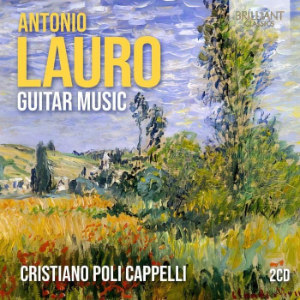
Antonio Lauro (1917-1985)
Guitar Music
Cristiano Poli Cappelli (guitar)
rec. 2022, Lugano, Switzerland
Brilliant Classics 96627 [2 CDs: 137]
Along with Agustin Barrios, Antonio Lauro is revered as a major and important contributor to the 20th century guitar repertory. Despite this, and aside from the conspicuous, they both share something significant in common: while Andrés Segovia was ‘saving the guitar from its poor repertoire’, he totally ignored the works of Barrios and Lauro, well almost. On one, solitary occasion he made a small concession and recorded Lauro’s, Vals Criollo (Natalia).The vinyl recording refers to it as Dance from Venezuela (FL 31.272). The playing and interpretation is superb, and one wonders why he never pursued additional works by Lauro?
Antonio Lauro was born in 1917 in Ciudad Bolivar, a city on the banks of the River Orinoco, Venezuela. Lauro took music lessons from his father, but when he died in 1926, Lauro and his two siblings moved, with their mother, to Caracas. Lauro started taking lessons in piano and composition at Academia de Música y Delclamación. However his later encounter with the music of Agustin Barrios, who was giving concerts in Venezuela, made such a deep impression on him that he gave up the violin and piano studies to dedicate himself entirely to the guitar. Lauro was the first Venezuelan to complete formal studies in classical guitar. He simultaneously pursued a career in popular music, appearing as part of a trio for voice and guitar, and travelling throughout South America.
Lauro was a fervent nationalist and his political convictions motivated him to make an in depth study of Venezuelan waltzes, characterised by frequent use of hemiola, brilliant rhythmic melodies as well as changes in metre and tempo. It was a concert by friend and pianist, Evencio Castellanos, based exclusively on Venezuelan waltzes, which especially inspired Lauro. Among his first and most famous compositions are the waltzes entitled, Tatiana, Andreina and Natalia. Collaboration with school friend guitarist Alirio Diaz, was the stimulus for a plethora of new compositions for guitar.
His compositions for guitar embody a combination of Venezuelan popular music with elaborate forms from the European tradition. In his compositions we find three components of endeavour: folk inspired pieces, exampled by the Venezuelan waltzes; demanding works which display the sophisticated aspects and features of Western compositional tradition such as Suite Venezolana, and contrapuntal style found in Imitaciones.
The guitar discography abounds with recordings of Lauro’s music. However this 2-disc set offers music not commonly recorded, nor widely available. His music based on popular Venezuelan waltzes is the best-known and most popular, and with sound reason. The music founded on sophisticated aspects of Western tradition and contrapuntal style, is less known and revered. However, in it we encounter different aspects of a composer demonstrating significant creative prowess.
Christiano Poli Cappelli, in addition to considerable teaching activity, is constantly involved in concerts in Italy and abroad. His interpretations have been widely recognised for remarkable sensitivity, clear and intelligible sound, and a strong sense of lyricism and songfulness. These are interpretive attributes he clearly demonstrates on these discs.
The golden standard for interpretation of Lauro’s music, especially the waltzes, has long been Alirio Diaz. In this music he exhibited a technical facility, mastery of complex rhythms, and especially a vibrancy which is difficult to replicate. If there is any validity in conjecture that native Venezuelans play the music of their country better than foreigners, this appears to be a case in point; alternatively it may just be co-incidental? That said, the renditions by Cappelli are of a high standard, musically and technically. There are nuances which won’t captivate the entrenched Diaz fan, but certainly impress those less familiar with his recordings. In pieces such as Cueca Chilena (12), of fast tempo and rhythmic demands, Diaz demonstrates a unique supremacy. This same command spans pieces like Seis por dorecho (28); however here Cappelli demonstrates just how well an Italian guitarist can perform the music of Venezuelan, Antonio Lauro. Bravo!
These discs are accompanied by informative notes in English, written by Cappelli and translated by Robert Sargant. Cappelli plays a guitar made by Philip Woodfield
Zane Turner
Help us financially by purchasing from



Contents
Disc 1
Ana Cristina
3 Venezuelan Pieces
Ana FLorencia
4 Valses venezolanos
Angostura
Carora
Cueca Chilena
Suite (Homenaje a John Duarte)
El Nino
El Marabino
El Negrito
Maria Carolina
Maria Luisa
Romanza
Sonata
Disc 2
El Totumo de Guarenas
La Catira
Suite venezolana
Triptico
Variaciones sobre una cancion infantil
4 Studies en imitaciones
Cancion
Flores de la Montana
La Gatica
Crepuscolar
Merengue
Momoti
Nelly
Nocturno
Oriente
Pasaje Aragueno
Pavana
Petronila
Virgilio
Seis por derecho


















